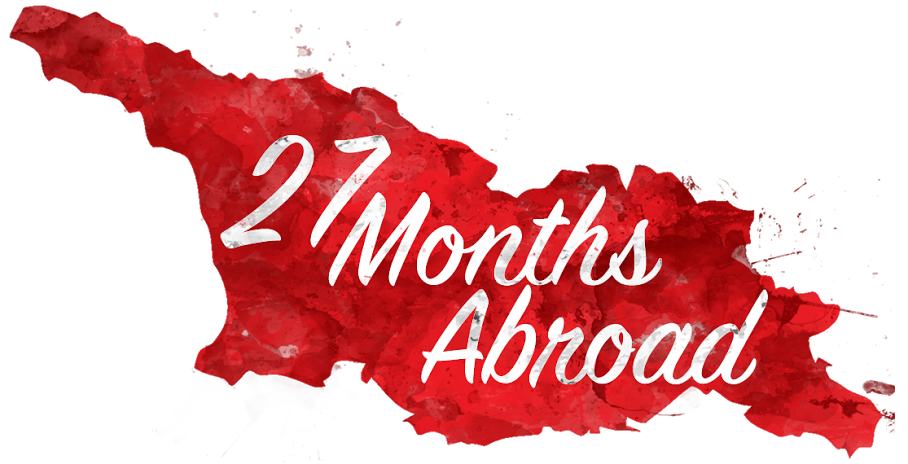Two days ago was a small win for me. Celebrate the small wins, they say. But what they don’t say, is sometimes how long you have to wait to get those glimmering moments. My Youth2Georgia counterpart got hired in September, about 2 months after I got to site. I took him to my Peace Corps’ Project Design and Management Workshop with me for a week shortly after that. It is now February and we are now finally working on our first major project together. Sure, we have had meetings, discussions, and mini-trainings, but we are now actually working towards something bigger. Ironically enough, our first project is….a Project Design Workshop.
Our Peace Corps training was in September and it was one business week long. Each IOD volunteer brought along one counterpart to the training in Sairme. I was lucky and I was able to bring both my World Vision counterpart and my Youth2Georgia counterpart. Typically Peace Corps hires translators for these events because a lot of counterparts speak limited English. My World Vision counterpart speaks English fluently, so she acted as a translator for my Youth2Georgia counterpart. She was also needed because my Y2G counterpart was so new to the organization and wouldn’t be able to provide much insight into the past or future projects.
At the training, we learned aspects of successful community projects, how to set proper goals and objectives, and how to write grants. Peace Corps equipped us with a lot of tools and resources to make us successful. They shared all the training materials with us via soft and hard copies as well. I couldn’t be any more grateful that they did that. I’m currently leveraging some of those materials for our own workshop. We are also leveraging other resources that Peace Corps provides. It is great to not create everything from scratch.

Instead of training that takes days, our training will only be a few hours long. Most Peace Corps Volunteers work with youth, and I’m not an exception. The training will be for high school students and it will most likely be their first introduction to project design. We are currently researching what to put in our 5-hour curriculum while making it fun and impactful. I want the students to walk away understanding the most basic concepts, such as what are project cycle; goals and objectives; and budget and evaluation. We are hoping that some of them will actually implement their project ideas.
So two days ago, I sat down with my counterpart for no joke 3.5 hours discussing the curriculum. What I like about being a Peace Corps Volunteer is that there are endless teaching opportunities (for me and them). As he was making various suggestions, it gave me an opportunity to exercise my coaching, mentoring, and/or consulting skills. It awarded him an opportunity to take advantage of my professional experience as well.
For example, he suggested that we input the SWOT (Strengths, Weaknesses, Opportunities, and Threats) Analysis in the curriculum. I asked him why he would want to teach a bunch of 14-15-year-olds that analysis. He highlighted that with every project, there are risks and the SWOT analysis explores risk. As correct as it may be, I suggested that we do not include SWOT analysis. I told him that when I learned it in college, it can be a complex theory and it is typically used for organizations and not for community-based projects. I also did not want to overwhelm the teenagers with too many theories. However, I did say we should explore how to include risks in the project design training framework.
Discussions with counterparts often include a lot of back-and-forth discussions. First, coming from two different cultures and educational backgrounds offer a diversity of thought. Second, since we neither speak the other’s language fluently, it creates a lot of room for miscommunication. Essentially, my counterpart explained his thoughts to me multiple times in broken English and I did the same with broken Georgian. Google Translate was also used heavily (thank god for the internet). Work does get done. Relationships are built. But, it can be slow and now I understand why patience is a virtue.
My small win this week is one of the reasons why Peace Corps’ service is not less than 2 years. I’ve been in-country for nearly a year and I’m finally working with my youth NGO counterpart on something big. It takes a while to gain trust and respect. It also takes a while to find your place in the organization. Most importantly, it takes a while to understand the community in which you serve. Therefore, imagine the mistakes I would have made if I tried to rush things. I would have no idea that the teenagers wouldn’t understand SWOT. I would have taken that suggestion and implemented it. Most likely, we would be met with blank and confused faces. However, because I’ve done a few trainings by now, I know that I should start with the over-arching concepts and focus on that instead.

Either way, the trainings take place next month. Wish us luck that everything will go smoothly. In the meantime, I am going to celebrate the fact that my counterpart and I have our first long and productive conversation. I’m going to hope that our hard work will pay off next month in our first major collaborative project.
